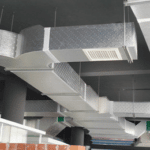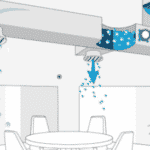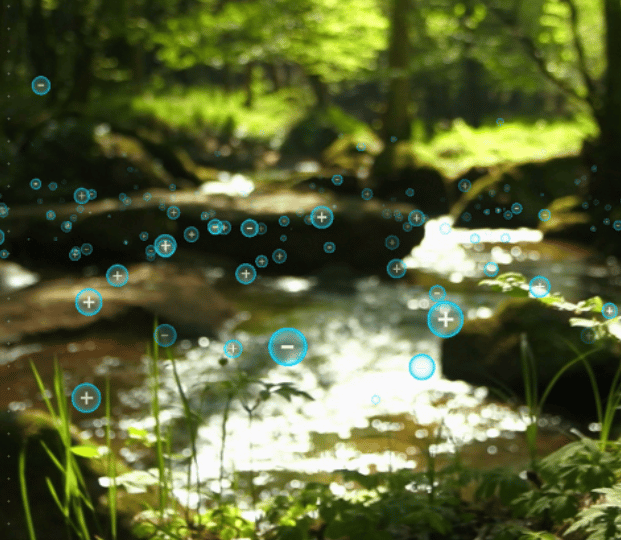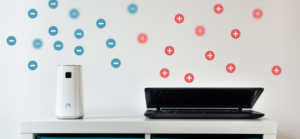Advantages and One Challenge of Using Commercial Bipolar Ionization
 Commercial Bipolar Ionization: Several breakthroughs have been made since the outbreak of the coronavirus. Whereas more and more people are vaccinating, governments are relaxing Covid 19 regulations globally; the frequent scare of new strains and pockets of outbreaks remind us of the need to stay safe by still practicing Covid 19 protocols at personal levels. The best breakthrough for industries and commercial facilities is the invention of Commercial Bipolar Ionization, which uses ions in the air to kill pathogens and filter out harmful particles from the air. Organizations that install this technology are likely to enjoy the following benefits.
Commercial Bipolar Ionization: Several breakthroughs have been made since the outbreak of the coronavirus. Whereas more and more people are vaccinating, governments are relaxing Covid 19 regulations globally; the frequent scare of new strains and pockets of outbreaks remind us of the need to stay safe by still practicing Covid 19 protocols at personal levels. The best breakthrough for industries and commercial facilities is the invention of Commercial Bipolar Ionization, which uses ions in the air to kill pathogens and filter out harmful particles from the air. Organizations that install this technology are likely to enjoy the following benefits.
Ease of maintenance – Commercial Bipolar Ionization
Once installed, the Commercial Bipolar Ionization units have two years before needing replacements. Within that timeframe, no maintenance of the units is needed. Because it is a relatively new technology, guaranteeing users that the device will not break down for two years is an advantage, as few technicians are skilled enough o properly diagnose and maintain such systems.
Complements existing systems
 Commercial Bipolar ionization systems are installed on already existing HVAC systems, which increases their efficiency in clearing harmful particles from the air. They reduce the operational burden of air conditioning systems, especially when there is positive pressure in confined spaces. Positive pressures usually involve the HVAC system supplying air from the outside into the office. When Commercial Bipolar ionization systems are installed, they reduce the burden of filtering in harmful particles by the HVAC filtration as they will have already caused the coalescing of harmful and toxic particles from the incoming air, making them easy to filter out. The capacity of Commercial Bipolar Ionization to kill pathogens also increases the effectiveness of existing HVAC systems.
Commercial Bipolar ionization systems are installed on already existing HVAC systems, which increases their efficiency in clearing harmful particles from the air. They reduce the operational burden of air conditioning systems, especially when there is positive pressure in confined spaces. Positive pressures usually involve the HVAC system supplying air from the outside into the office. When Commercial Bipolar ionization systems are installed, they reduce the burden of filtering in harmful particles by the HVAC filtration as they will have already caused the coalescing of harmful and toxic particles from the incoming air, making them easy to filter out. The capacity of Commercial Bipolar Ionization to kill pathogens also increases the effectiveness of existing HVAC systems.
Reduce physical intervention
At the height of the pandemic, commercial spaces had few options for disinfecting surfaces and airspace within their premises; these were usually limited to hand washing using soap, sanitizers, and disinfecting surfaces that staff and clients could come into contact with. However, Commercial Bipolar Ionization (BPI) reduces the need and frequency of such physical interventions. By constantly filtering out harmful particles from the air and inactivating viruses and bacteria, the BPI system reduces the time and resources used by an organization to facilitate the physical cleaning of work areas and surfaces.
 The main mode of transmission of the coronavirus is through the air. The Commercial Bipolar Ionization system is projected to be a game-changer for the current outbreak and future novel viruses transmissible through the air and contaminated surfaces because the system works best in confined spaces, which was the main domain of the coronavirus transmissions. Commercial facilities that install BPI add an extra layer of security against the virus and offer those infected more chances of being accepted into such spaces because the system guarantees the elimination of pathogens and other harmful substances from the air.
The main mode of transmission of the coronavirus is through the air. The Commercial Bipolar Ionization system is projected to be a game-changer for the current outbreak and future novel viruses transmissible through the air and contaminated surfaces because the system works best in confined spaces, which was the main domain of the coronavirus transmissions. Commercial facilities that install BPI add an extra layer of security against the virus and offer those infected more chances of being accepted into such spaces because the system guarantees the elimination of pathogens and other harmful substances from the air.
Legacy Commercial Bipolar Ionization devices produce ozone as a byproduct of the ionization systems. Even the latest Commercial Bipolar Ionization technologies require specific precautions to be undertaken during their installation and use to prevent ozone production.
Conclusion
While still a new technology, Commercial Bipolar Ionization has several advantages over the physically demanding disinfection processes that have existed so far. The system removes the burden of suspicion and responsibility for disinfecting surroundings and automates it, allowing staff and clients to interact freely in commercial settings. Further research needs to be done to reduce the fault of ozone production when special parameters are not met during installation or the functional life of the unit.
Address
7200 Distribution Dr, Louisville, KY 40258Phone: (502) 384-8500 Email: ACS.receptionist@AllianceComfortSys.com
Opening Hours
| Monday | 9:00 a.m. – 5:00 p.m. |
| Tuesday | 9:00 a.m. – 5:00 p.m. |
| Wednesday | 9:00 a.m. – 5:00 p.m. |
| Thursday | 9:00 a.m. – 5:00 p.m. |
| Friday | 9:00 a.m. – 5:00 p.m. |
| Saturday | Closed |
| Sunday | Closed |









